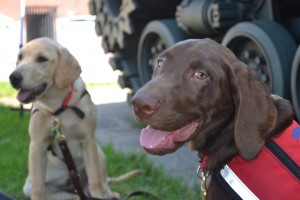Battle Buddies are begging to better help veterans

Campbell and Lejeune, two puppies in training, take a break on a warm fall day outside the courthouse. Photo by Courtney Swessinger
By Courtney Swessinger
Service dogs have been used for many different purposes. Some are trained to help those who are visually impaired. Some have been used by those with autism to help calm them during stressful situations, and others can even alert their owners if they are getting ready to have a seizure. Sometimes it takes a special dog to do special things; like those service dogs that help veterans who suffer from post traumatic stress disorder (PTSD).
This is where the Battle Buddies come in. These special dogs are provided through Family Alliance for Veterans of America (FAVA) to help veterans with everyday life.
Keisha Hendry, a freshman at Waldorf College said, “They’re a good thing to have, I mean, because people need them and they help out.”
To help service dogs be able to help veterans, the dogs go through a strict two-year training program.
The first year involves all the dogs. The dogs go through basic training which involves games which helps them to learn the skills they need for the future. The second year of training is specific to the veterans needs that each dog will be placed with at his 2 year old graduation ceremony. The dog’s training is done with FAVA, and after graduation it is up to the veteran that gets him to continue his training.
Steven Jordal is the current coordinator of the Battle Buddies program in Forest City and has been in charge of the program since March.
Jordal enjoys the entire program. When asked what his favorite part was he said, “Getting to introduce the world to new born puppies, teach them the correct behaviors to interact with the public and giving them a solid foundation for the 4-H students to build on.”
Jordal said the job requires a lot of patience since the puppies need to develop certain behaviors or come attached with certain behaviors that need to be addressed. So he has learned to turn training into fun time and the puppies learn a new game involving positive reinforcement.
These dogs can do perform a multitude of tasks from picking up small paperclips or fetching remote controls, they can turn on and off light switches and can pull on a sleeve to pull off a pant leg to help with the removal or adding of clothing.
FAVA’s website states, “FAVA provides information, education, advocacy and support to families of veterans and veterans across America at a time of their critical need. Such need arises, for example, when veterans return from combat with Post Traumatic Stress Disorder (PTSD) and/or Traumatic Brain Injury (TBI); when veterans and their families need assistance in getting help from the VA; when veterans suffer from addictions to drugs or alcohol; when veterans have encountered the criminal justice system, including incarceration; when veterans have attempted, or committed, suicide; in short, when veterans and their families are suffering in any way from service related issues and problems. Focused assistance to veterans and especially, their families is FAVA’s prime objective.”
